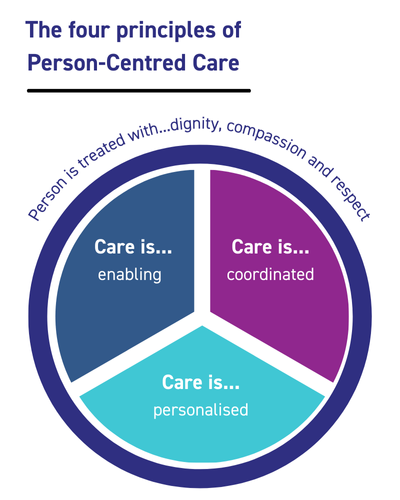
| 23 January 2025
There are many terms used to describe person-centred care, including ‘person-centred care’ ‘collaborative care’, ‘resident-centred care’, ‘client-centred care’. Each of these terms is used within specific contexts (e.g. palliative or end-of-life care) but they all describe the same approach to care provision.
The meaning of person-centred care
Person-centred care focuses on the care needs of an individual. It’s a term used to describe care which is responsive to an individual’s personal circumstances, values, needs and preferences. By adhering to person-centred care principles, staff are empowered to cut through the processes and systems to provide care which is specific to the patient’s individual requirements.
The aim of a person-centred care approach
By focusing the individual, it’s hoped that healthcare organisations, such as the NHS, will put the individual at the heart of their care, improving patient experience, care quality and health outcomes. The aim is to involve patients, service providers, families and carers within the decision-making process so that an effective and positive healthcare experience is achieved. Person-centred care means focusing on caring about a patient’s needs rather than the needs of the service.
Why is providing person-centred care so important?
Involving people in the planning of their own care is recognised as a key component in developing high-quality healthcare provision. Over the past decade, a considerable amount of work has been carried out to make health and social services more person-centred.
By putting people at the heart of their care the quality of the support they receive is improved, as people have access to services when they know they need it. As a result, people are more willing and active in taking care of themselves, so pressure on the system as a whole is reduced.
Within the UK there is a rising demand for healthcare services, as people begin to live longer with a variety of health conditions as they start to age. It’s been found that person-centred care can improve an individual’s health, so the overall strain on health services is reduced.
A collaborative approach to healthcare
The Health and Social Care Act 2008 (Regulated Activities) Regulations 2014 states that “The intention of this regulation is to make sure that people using a service have care or treatment that is personalised specifically for them” and sets out guidance on what providers need to do in order to facilitate a person-centred approach.
Through person-centred care patients gain from a collaborative approach to their own healthcare, as their own opinions are important and valued. The healthcare practitioner will consider their patient’s opinion and their own knowledge to deliver healthcare which the patient is happy with.
However, it’s important to remember that not all people will tell the healthcare practitioner what they feel. They may feel awkward or even live with a condition which makes communication difficult, such as dementia or a learning difficulty. Through the use of appropriate communication techniques, it should still be possible to encourage a person to participate in the planning of their own healthcare and the decisions involved. This can be achieved through information provided in an appropriate form and regular consultations, where they are able to discuss the development of a treatment plan.
Balancing safety, comfort and well-being
Within all healthcare professions, a person’s health is the most important factor, but through person-centred care, their safety and comfort are also considered. To guarantee people are comfortable, the healthcare provider needs to be considerate at every stage of the pathway causing discomfort, for example, being hungry, thirsty, cold, hot, uncomfortable or even in pain. By always putting a person’s well-being first, there is no part of the healthcare plan which can cause any physical or mental harm.
Providing person-centred care also means being aware of their spiritual well-being. A spiritual approach goes beyond a person’s religious beliefs, it also takes into consideration relationships, values and some individuals’ need for self-expression.

An ethical approach
Almost every employee within a healthcare service is bound by an ethical code of conduct. There’re multiple codes of conduct for healthcare in the UK, including codes for healthcare support workers, adult social care workers, and healthcare professionals. They’re designed to create a standard of performance which ensures the care provided is respectful, fair, non-judgemental and non-prejudicial. The code ensures each individual providing care is aware of their responsibility to a person’s health and welfare. An important aspect of the code of conduct is the definition of an individual’s accountability for the professional care they provide.
Person-centred care to improve the quality of healthcare
Research published in the National Library of Medicine, reported that person-centred care can lead to improved health outcomes. Developed in partnership with over 50 stakeholder groups, the NHS Comprehensive Model of Personalised Care was introduced across England, reaching over 2.5 million people by 2023/34, to establish;
- Whole-population approaches to supporting people of all ages and their carers to manage their physical and mental health and wellbeing, build community resilience, and make informed decisions and choices when their health changes.
- A proactive and universal offer of support to people with long-term physical and mental health conditions to build knowledge, skills and confidence and to live well with their health condition.
- Intensive and integrated approaches to empowering people with more complex needs to have greater choice and control over the care they receive.
Person centred approaches is also a core skills education and training framework that articulates what it means to be person-centred and how to develop and support the workforce to work in this way. It aims to distil best practice and to set out core, transferable behaviours, knowledge and skills. It is applicable across services and sectors (e.g. health, social care, local authorities and housing) and across different types of organisations (e.g. public, private and not for profit).
What does this mean for healthcare practitioners
The approach to person-centred care requires healthcare professionals to examine, identify, communicate and challenge traditional views. It means that all healthcare practitioners need to become more aware of their attitudes, ways of communicating and behaviours at every interaction with an individual, whether it is a clinical procedure or discussion. This may involve changing current processes, but the overall quality of care will be improved.
Person-Centred Care eLearning
This course has been structured to give learners the opportunity to explore the key concepts of person-centred care and how they apply these concepts in their practice, within their teams and organisation.
